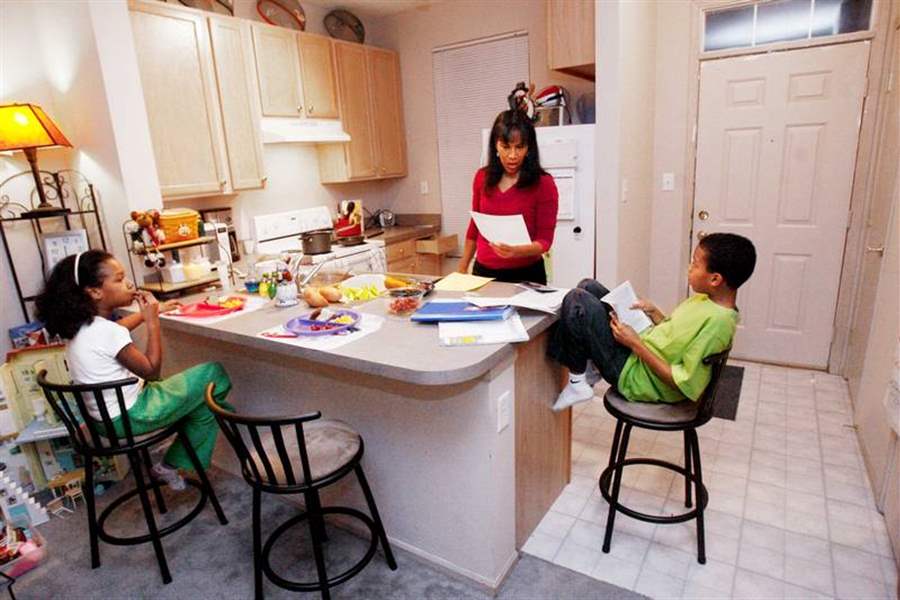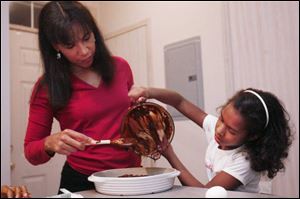
Mom knows best: Follow your instincts, not societal pressure, expert says
12/9/2006
Karen Sanders goes over homework with Clarke, left, and Aidan. She often falls back on mother's intuition and the advice of her grandmother, who had a second-grade education.

Ms. Sanders and Clarke spend some time together making brownies.
This past fall, Clarke Sanders, a Central Elementary School second-grader in Sylvania, decided to branch out from dance and music and give athletics a try. Tall for her age, Clarke thought she d play volleyball.
Her mom, Karen Sanders, researched the sport on the Internet and decided to sign up her daughter for a local club that had the highest percentage of high school girls earning college scholarships. I just didn t want to start at the Y, she remembers ruefully.
As Ms. Sanders listened to the coaches at the first meeting, her heart rate shot up. Girls families would pay about $1,000 to play and would travel several hours to tournaments every weekend for about three months. I came to my senses, she said with a laugh. Do I need to do this to an 8-year-old child so that 10 years from now she can get a scholarship?
Sanders, a single mom of Clarke and 11-year-old Aidan, listened to her gut. Her gut told her that her daughter needed play, not pressure.
Good for her, said Paula Spencer, author of the recently released book, Momfidence!: An Oreo Never Killed Anybody and Other Secrets of Happier Parenting (Three Rivers Press, 288 pages, $12.95). Ms. Spencer, a contributing editor to Woman s Day and Parenting magazines, humorously shares her own mothering mishaps and urges mothers to heed their instincts. Momfident moms are not so quick to succumb to society s pressure to have their children do more and be more.
(Ms. Spencer doesn t talk about dadfidence, she writes, because men are genetically predisposed to not ask for directions. Even about raising children.)

Karen Sanders goes over homework with Clarke, left, and Aidan. She often falls back on mother's intuition and the advice of her grandmother, who had a second-grade education.
From the moment of conception, moms are bombarded with advice from all corners. Better hold those headphones up to your growing belly so the fetus gets a jump start on Mozart. And who cares if you just endured 24 hours of grueling labor? You d better let that new tyke spend the night in your hospital room not the nursery or you may inhibit bonding.
How do you sift through this maelstrom of mommy do s and don ts? According to Ms. Spencer, a mother of four who s been writing about parenthood for two decades, moms need to give up on the idea of there being one perfect way to parent.
It wasn t until she had four children of her own that Ms. Spencer realized the conventional wisdom she d been passing along in her writing wasn t much use in her chaotic, spit-up-ridden world. Now she tries not to take parenting so seriously.
It s not such a radical notion, but nobody s saying it, she said.
In fact, they re saying quite the opposite. Search for parenting books on amazon.com and you ll find 44,852 volumes on the subject. You can read about attachment parenting, positive parenting, connection parenting, and parenting your anxious child. It s enough to send the anxious parent to the store for a pint of Ben and Jerry s.
No down time
When she first became a mom, Ms. Sanders read her fair share of books, listened to advice from her mother and grandmother, and watched child-rearing expert Dr. T. Berry Brazelton on TV. None of them agreed, she remembers.
It doesn t help, she said, that the media offer such unrealistic portrayals of mothers. They either show neglectful mothers who need Nanny 911 or perfectionist mommies who put only organics on their dinner tables, she said.
She feels like a renegade mom at times, swimming against the tide of what s considered acceptable, Ms. Spencer said. She had to get special permission for her second-grade daughter to walk home from school. (No one walks home anymore.) Even the contents of her pantry were cause for a collective gasp of surprise from her 11-year-old daughter s friends. Oh, you have Oreos, white rice, and Pringles! the girls said. They each took a sampler baggie home when they left.
Our culture s effects on parenting are far-reaching, according to child and family therapist Leslie Witherell, who has seen thousands of children and parents in her Toledo practice over the years. Children are being rushed academically, athletically, and socially. And no big news here: they re over-scheduled.
[Our culture has] influenced in a negative way our ability to effectively parent children, Ms. Witherell said. And that s too bad.
Ms. Sanders mother, Juanita Stephens, mourns the lack of down time for her six grandchildren. When she was rearing Ms. Sanders and her two brothers, there weren t so many choices. My son asked me, How did you do it? she said. I told him, I didn t do it. Her children did their homework after school and then played. That s it.
The effects on our children of all this smothering is the untold story, Ms. Spencer said. For one, the structured play and organized classes don t allow children to practice the basic life skills they ll need to navigate the world they ll be living in someday.
Think about how you played as a child, she said. Old games like dodgeball and Spud let us practice life skills: negotiation and setting up rules. Now dolls come with complete storylines. Kids have structured play. There s no room for creativity.
She feels fortunate that she lives in a neighborhood where her children are out riding scooters and playing football with their friends after school, Ms. Sanders said.
As a counselor at Byrnedale Junior High School, she sees the negative impact of too much structure on children. When everything is planned and controlled for them, children don t know how to handle obstacles like bullying and peer pressure. They keep looking to others to rescue them, she said.
She counsels many anxious students and spends a lot of time teaching them how to handle stress in healthy ways.
Back to basics
Ms. Witherell also sees children who aren t equipped developmentally to deal with the advanced tasks we re handing them. She gives an example of a child prodigy who plays piano with the Boston Pops at 6 years old. We tend to see that child as a mini-adult. But he s still going to want a blankie when he goes back to his very expensive hotel room at night, she said.
Not paying attention to these developmental needs can be harmful, she warns. Children are being asked to integrate information they don t have the capacity to integrate, she said.
So how can mothers get a shot of momfidence ? It helps to laugh often and talk yourself off the cliff, Ms. Sanders said. She often falls back on mother s intuition and the advice of her grandmother, who had a second-grade education: It s easier to bend a twig than break a branch. In other words, shape your children while they re young.
Relax and return to the basics, Ms. Witherell also recommends. Offer your children structure, safety, consistency, and love. Be the good enough mother, she said, referring to a concept pioneered by child-care expert Donald W. Winnicott. (He advocated providing what an infant needs, but not satisfying every need on the spot.)
Most importantly, know the developmental stages of your children and what they need at what age, Ms. Witherell said.
Don t totally give up on experts, either, Ms. Spencer said. But read or listen to more than one and compare their views. Get some perspective, she said. Talk to other mothers.
And remember, no matter how much you follow the expert advice, the guilt will still be there. Guilt is a permanent condition of motherhood, like the saggy belly, Ms. Spencer said. You need to notice it s there, then set it aside.
In the end most kids come out OK, she reminds us. We all survived, she said.
And our mothers didn t do our homework for us or serve us free-range beef.